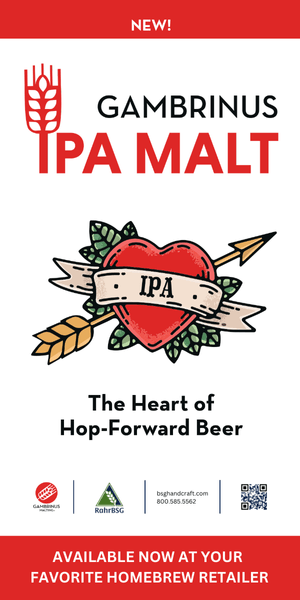December 2003
Recipe
Carolina Brewing Co.’s Nut Brown Ale clone
According to Carolina Brewing Co., “A medium bodied, dark brown ale with a complex chocolatey, toasted malt taste. It has a dry finish that makes it distinct from some of the sweeter brown ales. We use five different types of malted barley to give the beer its color and variety of malt flavors.”
Recipe
Red Hot Blond
The second place winner, Steve Hacker, was a Belgian-style golden strong ale enlivened by a healthy addition of Red Hots, the bright red cinnamon candy. Again, the actual entry was a spinoff of a 5-gallon (19 L) batch, so the amounts have been extrapolated.
Recipe
Whopper Stout
Foam Ranger Kuyler Doyle was successful again with his “Whopper Stout.” Inspired by that year’s “Fred Tasting” pairing of stouts and chocolate, Kuyler “Figured that malted milk and chocolate from Whoppers in a beer would be a good thing.” However, he was confronted with the issue of the cheap, oily chocolate used in the actual candy. “I substituted Carnation’s malted milk for the Whopper flavor,” states Kuyler. “I used a blend of regular and chocolate flavor malted milk.”
According to Kuyler, much of the malted milk settles on the bottom, but the flavor comes out in the finished product. Doyle credits part of the win to his pairing the beer with Whoppers during judging. (Entrants were encouraged to include samples with the entry.) The malted milk additions are an estimate, since the beer submitted was a “spin-off” of a larger batch.
Recipe
Wee Hottie
Kuyler Doyle’s “Wee Hottie” took second place behind the ZEALOTS entry. Kuyler’s choice was dictated by the style’s primary ingredient. “I thought the malty sweet character of a Scotch ale would pair well with spicy heat from chiles,” states Kuyler. “Since Scotch ales are allowed to have a smoky flavor, I went with that as the link. I added some rauch malt to the blend and used smoky chipotle peppers for the heat and flavor.” Like the ZEALOTS, Kuyler did a spinoff of a 5- gallon (19-L) batch. The recipe below has the peppers scaled up for full a 5-gallon (19-L) batch.
Recipe
Chili Head Fred Barleywine
Marc Martin headed a group of Austin ZEALOTS who were out to make a name for themselves at the Dixie Cup. Marc, the Primary Fermenter, Corey Martin the Secondary Fermenter, and another key member, Keith Bradley, decided they should honor the ever present Fred Eckhart by brewing a clone of that famous namesake Barleywine made by Hair-of-The-Dog brewing, “Fred.” After a lengthy (12 hour) brew day and six months of aging, two quarts were tapped from the keg and sliced Jalepeno, Serrano and Habanero peppers were steeped in the cold brew. Spoonfuls were tasted at 8–12 hour intervals until just the right level of heat was present to mingle with the malt and hops. Balance with a lingering heat was the goal and it was obviously achieved, since it took home first place!
Recipe
Texas Imperial Brown Ale
American Brown ale was once referred to as Texas Brown ale, since the Dixie Cup was the first competition to recognize the style. In honor of that, David Cato brewed his Texas Imperial Brown Ale, which is more or less a brown I.P.A. It’s a richly flavored beer and very hoppy, appropriately enough with Amarillo® hops. This beer, by David Cato took 2nd place in the Imperial Beer category.
Recipe
Imperial Stormtrooper IPA
Foam Ranger Jimmy Paige took first place in the 2000 Dixie Cup with an Imperial IPA which he claims was more “like an American Barleywine at the time it was judged.” Aged approximately 7 months old at judging, Jimmy claims he named the beer Imperial Stormtrooper because “that was the only thing I could think of with the word ‘Imperial’ in it.”
Recipe
24 Carrot IPA
This beer, by Bev Blackwood, was “dry carroted” and the mouthfeel defined as “crunchy.” In truth, the carrot stick included in the contest bottle picked up a lot of the hop character of the I.P.A. and proved to be quite tasty, as was the beer!
Recipe
Panther Pee
Homebrewers who attended the 1999 Dixie Cup — The Fred Files — know that “The beer is out there.” Don Sadja relates how he came up with his stupid idea. “I thought: Why not use a great imperial stout recipe as a base and do something stupid like add raspberry flavoring to it.” Apparently not so stupid, as it produced a very drinkable beer!
Mr. Wizard
Hop bags
My overall philosophy with brewing is extremely simple and goes something like this: “If the method works to produce good tasting beer with the desired aroma, stability, appearance and material yields —
Article
8 Big Novelty Beers of the Dixie Cup
Every year, the Foam Rangers host the Dixie Cup homebrew competition. And every year, there is a special novelty beer category that challenges brewers to think outside the carboy. Here are some of the winners.













